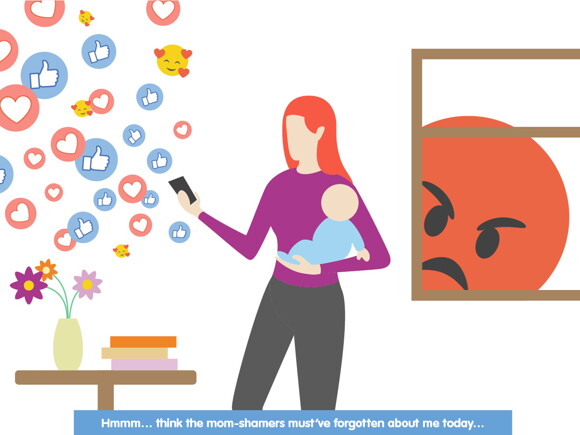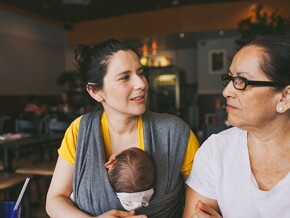
Mom shaming online: what parents need to know about social shaming
What is social shaming and when does it become call out or cancel culture?
Social shaming is a form of public shaming that uses social media to humiliate someone online. With so much of our lives documented on the internet, how we raise our children is something that often comes under attack.
Parents might post a simple picture—perhaps something as harmless as baby’s first outing or an update on how their child’s first foray into solid foods is going—only to be met with comments that feel like mom shaming. For example, “Your baby’s head isn’t supported in that sling,” or “Did you know that store-bought hummus contains too much salt for children?” Even if the comments come from a place of wanting to help, they can severely knock a new parent’s confidence and it can happen to anyone—from your nextdoor neighbor to celebrities and royals alike.
Call out or cancel culture is an extreme form of online shaming where people are publicly called out for bad behavior and boycotted or excluded in some way, either online or in real life. Those in the public eye are most likely to be on the receiving end of this. For example, a celebrity might be accused online of being a bad parent for losing their temper with their child and, as a result, members of the public unfollow them on social media and refuse to support their work, perhaps by not listening to their music or watching their films, and so on. But it can also happen to ordinary moms and dads who find they’re defriended on social media or excluded from parenting groups, for example, after posting something contentious online.
Who are the people behind online shaming and why do they do it?
Frustratingly, you may not know who is posting nasty comments on your feeds. Social media makes it easier than ever to share opinions—often with strangers and sometimes anonymously. This means there may be no accountability or repercussions from social shaming, which can also enable trolling—the act of positing offensive comments online to deliberately antagonize someone.
Or it could be that you know the culprit very well! You may wonder why your mom, brother-in-law, or best friend could be so insensitive with their comments. But causing you hurt may be the last thing on their mind. Ever since parenting books emerged in the mid-20th century and people became more mindful about parenting, advice—which can often feel like criticism—has increased in response. Throw the public platform of social media into the mix and it can turn into online parent shaming, or more commonly mom shaming.
Topics that tend to spark debate cover many aspects of child-rearing, from diet during pregnancy to breastfeeding in public, the evils or benefits of screen time and whether or not you’ve returned to work. And while comments are often intended to make your life easier and help you to raise a happier, healthier child, they can in fact cause huge amounts of extra stress.

What is the effect of parent shaming online?
Even the most confident of parents may start to experience self-doubt when faced with criticism—especially when it’s in an online space and they feel publicly shamed. And it’s a problem that affects some parents more than others in certain parts of the world.
For example, in China 71% of parents feel intense social pressure on how they raise their baby. In particular, 54% say they feel pressured by others when it comes to what or how to feed their child. This is compared with 22% of parents in Sweden feeling social pressure in how they parent and only 4% relating this to feeding. By contrast, 67% of parents in China feel stressed as a result of the pressure and differing opinions they receive versus just 9% of parents in Sweden.
Can you control online shaming?
If you want to have a social media presence, it’s very difficult to control the comments that you receive. However, you can control how you respond.
This way, you can enjoy the many benefits that social media brings like connecting with other parents around the world, getting support and swapping tips. And, of course, set positive examples to your children in how we treat others online.
Recommended checklists
Read about other struggles of parents worldwide

Planet Parent
Sources
The Parenting Index, First Edition 2021, theparentingindex.com
Last revised: May 2022





